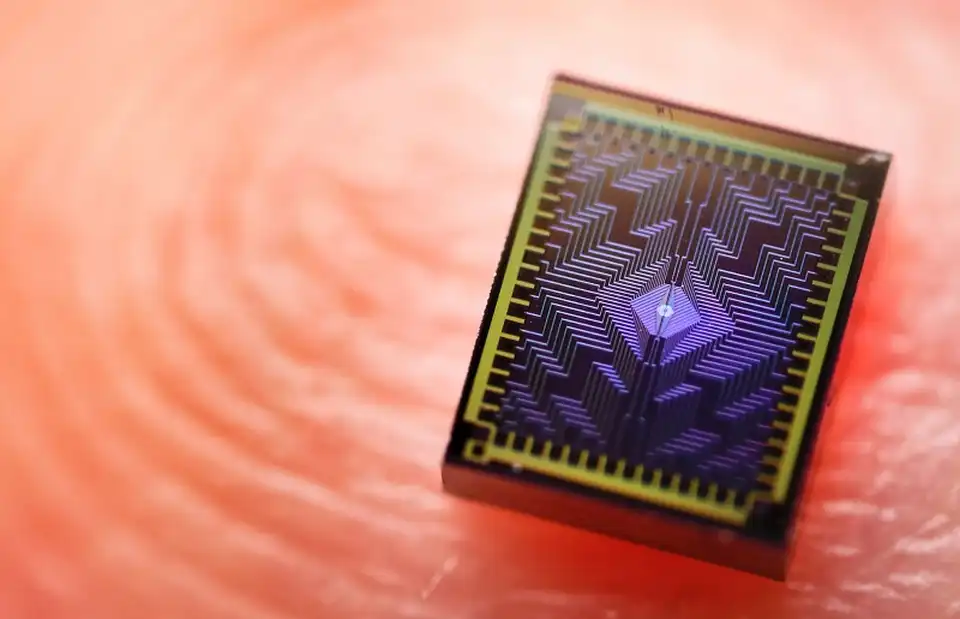

Tunnel Falls is Intel’s most advanced silicon spin qubit chip
(photo: Intel)
Intel has made an important announcement in the field of quantum computing. The company announced that it is releasing a 12-qubit Silicon Tunnel Falls chip — Intel’s first quantum processor with silicon qubits — and it’s now available for use by quantum computing researchers.
Using Tunnel Falls, scientists can start experimenting and calculating right away, instead of trying to make their own devices. It opens the way to a wider range of research, including studying the fundamentals of qubits and quantum dots and developing new methods for working with multi-qubit devices, HPC Wire commented.
“Tunnel Falls is Intel’s most advanced silicon spin qubit chip to date, building on the company’s long-standing expertise in transistor design and manufacturing. This is the next step in Intel’s long-term strategy to build a full-featured commercial quantum computing system,” said Jim Clark, director of quantum hardware at Intel.
“Although there are fundamental questions and challenges to be addressed on the way to fault-tolerant quantum computing, the academic community can now explore this technology and accelerate research progress,” he added.
Tunnel Falls is manufactured on 300mm wafers in the Intel D1 factory. The 12-qubit device uses Intel’s most advanced transistor manufacturing capabilities, such as extreme ultraviolet (EUV) lithography.
In silicon spin qubits, each bit of information (0/1) is encoded by the spin (direction of spin) of a single electron. Each qubit device is essentially an electronic transistor, allowing it to be manufactured using technology similar to standard CMOS lines.
Using this proven technology, Intel achieves a 95% wafer-wide Tunnel Falls chip yield, producing more than 24,000 working quantum chips per wafer. These chips can form configurations of 4 to 12 qubits that are isolated or used in operations simultaneously, depending on the researchers’ needs.
Intel believes that silicon spin qubits are superior to other qubit technologies because of their synergy with advanced transistors. Being the size of a transistor (≈ 50×50 nm), they are a million times smaller than other types of qubits and, according to Nature Electronics, “may be the platform with the greatest potential for scaling quantum computing.”
Like most qubits, semiconductor-based spin qubits can be implemented in many ways. The underlying technology makes it possible to detect individual electrons in isolated “wells” and manipulate their spins to encode information in a quantum state.
There are three approaches to fabricating silicon spin qubits, including Loss-DiVencenco, Single-Triplet (S-T0), and Exchange-Only configurations. “Each solution has its strengths and weaknesses in terms of manufacturing, physics and scalability,” explains Clark.
According to him, Intel is exploring many parameters, such as different quantum dot sizes, different geometries, different qubit lengths. The company also builds benchmarks into its chip to determine performance.
Meanwhile, Intel has partnered with several US labs for quantum computing research. The company plans to make its Intel Quantum Software Development Kit (SDK) version 1.0 available to developers and researchers later this year through the Intel Developer Cloud.
“Our goal is to connect the Quantum SDK to real hardware. This is a kind of disaggregated approach. For now, we are focusing on both software and hardware, and will merge the two going forward. There is a huge amount of work ahead to characterize these devices and then write many scientific papers,” added Clarke.
Representatives of scientific institutions participating in the program agree that the Intel commitment is an important milestone in the process of democratizing research on spin qubits and their prospects for quantum information processing. This, according to scientists, will bring industry, academia, national laboratories and government closer together.
The researchers also praise the reliability of Tunnel Falls, and the ability to work with industrial Intel devices, they say, opens up prospects for technical progress and learning.
Intel is already developing its next-generation quantum chip based on Tunnel Falls, which is expected to be released in 2024. In the future, the company plans to collaborate with research institutions around the world to create a quantum ecosystem.